Iraq and Afghanistan on Stage
"Acts of War: Iraq and Afghanistan in Seven Plays," edited by Karen Malpede, Michael Messina and Bob Shuman, steps into the moral vacuum left by politicians, corporations and religious leaders."Acts of War: Iraq and Afghanistan in Seven Plays" steps into the moral vacuum left by politicians, corporations and religious leaders.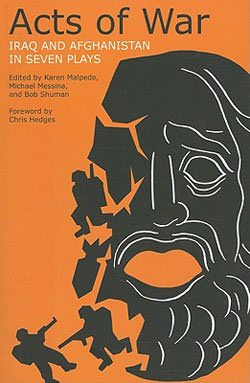
“Acts of War: Iraq and Afghanistan in Seven Plays” A book edited by Karen Malpede, Michael Messina and Bob Shuman
“War is neither glorious nor noble,” Chris Hedges states in his trenchant foreword to “Acts of War: Iraq and Afghanistan in Seven Plays,” a powerful new collection of American and British plays. War marks those who battle, those who stay home and those caught in the crossfire in ways we can barely articulate. Given the cultural, political and religious taboos against discussing the actual human cost of warfare, Karen Malpede, Michael Messina and Bob Shuman, in editing this anthology, have made a vigorous contribution to the political and ethical debate.
These plays step into the moral vacuum left by politicians, corporations and religious leaders, and reveal war as something other than an unequivocal victory. They explore how theater can intervene in the discourse of war, rather than let it be hijacked by politicians, warmongers, war profiteers and others. They raise the necessary question: What are the responsibilities of civilians during wartime? Hedges opines that war is always about betrayal: “of the young by the old, of idealists by cynics, and of solders and Marines by politicians.” In these plays, we hear the voices of the betrayers and the betrayed. We are even startled to discover those voices dueling within one individual’s own private hell.
Malpede, in her introduction, highlights the connections among Athenian democracy, tragedy and conscription. Aeschylus and Sophocles were generals, Euripides fought, and their plays delved into the effects of armed conflict on the conquerors and conquered. The playwrights in this volume, though not combat veterans, have each blazed a trail, bringing to the public an experience of war that only the initiated glean. Malpede calls for a “theater of war and witness,” in which we can examine what the choice of war as an instrument of government means for the men and women who conduct it, the citizens whose tax dollars fund it, and the innocent foreign civilians who lose their homelands, families or lives.
With our volunteer army, and the raw wound of 9/11 fading with time, it is easy for us to ignore these wars and their destruction. But with so many soldiers returning with grave injuries, some diagnosed with post-traumatic stress disorder, others unable to find employment or housing, and increasing numbers resorting to violence, we must pay heed. How many innocent Iraqi and Afghan civilians have lost their lives in these wars? Malpede asks. With the ever-expanding debt ceiling and looming budget cuts, will we elect to gut domestic programs to ensure further massive military spending? To what end?
Acts of War: Iraq and Afghanistan in Seven Plays
By Karen Malpede (Editor); Michael Messina (Editor); Bob Shuman (Editor); Chris Hedges (Foreword by)
Northwestern University Press, 400 pages
From Shakespeare to Brecht to Kushner and beyond, the theater has a long history of scrutinizing humans buffeted by social and political change. Theater shows us how the individual may choose to act when faced with moral quandaries, undeniable horror and perhaps no good answer. Theater allows us to experience intense emotions, such as terror and rage, without compelling us to act on them instantly, thereby encouraging communal meditation on the problems of governance, the nature of evil and the potential for reparative justice. Each of these plays tackles a different aspect of war and articulates it in a radically distinct, exciting theatrical style.
The collection opens with “Guantanamo: Honor Bound to Defend Freedom,” a harrowing docudrama montaged from detainees’ letters, news conferences and transcripts of interviews conducted by the authors, former Guardian editor Victoria Brittain and South African novelist Gillian Slovo. The title refers to the Joint Task Force Guantanamo’s motto, coined under the command of Army Maj. Gen. Geoffrey Miller, who then left Guantanamo to implement the interrogation system at Abu Ghraib. The brilliant coup de theater of “Guantanamo” is in putting the faceless detainees, their terrified relatives and legal advocates front and center. The practice of designating people as enemy combatants rather than prisoners of war, and thus sidestepping the Geneva Conventions, slowly unspools as we listen to the testimony of detainees, family members, solicitors, a lord justice, American politicians and others affected by the war on terror. Linguistic nuances in the spoken evidence restore the “other” to rich humanity and bring the suspects so vividly to life that we actually feel their terror at being transported in the trunk of a car, chained, hooded and interrogated, and held indefinitely for no specified crime. Is suspending due process, humane treatment and fairness really defending freedom?
Naomi Wallace, an American playwright living in London, masterfully pursues a different tack in “No Such Cold Thing,” set in a desert near Kabul, Afghanistan, in the fall of 2001. The title is taken from a George Herbert poem, “The Flower,” in which flowers blooming after snows melt suggest that grief is a temporary thing.
Two teenage Afghan sisters, torn apart by war, are suddenly reunited, but the prickly differences in their natures, one rebellious, one more traditional, speak to the danger and contradictions of life under the Taliban. It is only as more magical elements accrue, such as the young sister Alya sprouting spiny quills like a hedgehog, that we realize both girls are dead. This is a ghost dance of uneasy souls cut off too rashly to realize that they have been slaughtered. A third spirit, Sergio, the U.S. Army soldier who fired on them, wakes up under the impression that he is back home at his mama’s house after a night of serious drinking.
Drenched in gorgeous lyricism, and a longing for sensuality and experience expressed by souls in transit between death and the afterlife, “No Such Cold Thing” forces us to witness the betrayal of the young by the old — we are killing our children, and even in death, they long for life.
Lydia Stryk, an American playwright based in Berlin, ventures into the heart of the U.S. military family in “American Tet.” Much as Arthur Miller did with the Lomans and the mythos of the salesman, Stryk explores how the core dreams, denials and unspoken traumas of the Krombachers, an Army family, bleed into every aspect of their lives to exact a payment when they least expect it.
Command Sgt. Maj. James Krombacher served in Vietnam, where he buckled under inhumane torture at the hands of the enemy and talked, but he lives with this secret shame and his untreated post-traumatic stress disorder, retired to his garden. His wife, Elaine, has lived 31 years as an Army spouse and defines herself by the patriotic support she provides as a leader of the Family Readiness Group. Her son, Danny, is serving in Iraq, and her daughter, Amy, is at loggerheads with Elaine, challenging her mother to question the purpose of this or any war. Elaine befriends Nhu, a Vietnamese woman who works in a Chinese restaurant. Nhu introduces Elaine to the teachings of Buddha: “life is suffering.”
Stryk introduces a final pivotal character, the neighbor’s soldier daughter who has lost her face in a blast in Iraq and is returning home psychically and physically maimed. Stryk then delicately and violently rings the changes on these opposing approaches to life, one denying doubt and empathy, one embracing suffering and change. “American Tet” builds to a horrifying climax, but the presence of Buddha; the apparition of a dead girl, Dao; and Amy’s breaking out of the fold hold some hope for reparative healing and justice.
Two of the plays in this collection, David Hare’s “The Vertical Hour” and Malpede’s “Prophecy,” call particular attention to the act of listening as an act of empathetic healing. If “American Tet” explores how we use language to keep reality at bay, then the high points in these plays are achieved through a keen recognition of another’s alienation and pain. In an evocative, late night conversation on the lawn, Nadia Blye, a former war correspondent and current professor at Yale, encourages Oliver Lucas, her fiance’s guarded father, to open up about his private pain: “In combat medicine, there’s this moment — after a disaster, after a shooting — there’s this moment, the vertical hour, when you can actually be of some use.” Hare considers “The Vertical Hour” a companion piece to his epic Iraq War play, “Stuff Happens.” He was interested in exploring a Henry James landscape in which the optimistic American (modeled loosely on Samantha Power), convinced of the need to intervene militarily in foreign countries, is confronted with a roguish, jaded Brit who has retreated from the inordinate wreckage his freewheeling lifestyle has caused. Lucas, a doctor who has accidentally killed, is a fantastic character, his language charged and his aim true. And while Blye rises to Lucas’ challenge in their vertical hour, she is less convincing as someone seared by the atrocities she has witnessed in Bosnia, making it hard to feel the full force of her decision to leave academia to return to Iraq.
Malpede’s “Prophecy” is an ambitious, sprawling work, interweaving so many volatile plotlines that, for this reader at least, its world sometimes appears theatrically calculated rather than real. If everyone is suffering from post-traumatic stress disorder, it’s hard to hold anyone accountable. According to Malpede’s staging note, “the play bridges modernist realism with something older and more classical.” There is the story of Jeremy Thrasher, an Iraq War veteran so stewed in self-loathing that when he performs in an acting class, he hurls a chair to shatter a mirror.
Sarah Golden, the teacher, traumatized by the death of her first love, Lukas, under suspicious circumstances in Vietnam, is dazzled by Jeremy but ill-equipped to help this soldier process his rage. When we discover that Sarah’s boss, the dean of the acting school, once produced a Broadway show that was her starring vehicle and may have had a hand in Lukas’ combat-related death, we are jolted out of modernist realism and into hyperbolic melodrama.
The plot thickens. Malpede introduces an Abraham, Sarah and Hagar subplot with Mariam, the daughter whom Sarah’s husband, Alan, has by Hala, a Palestinian-Lebanese human rights worker. One of the most affecting scenes occurs late in the play when Sarah in New York calls Hala in Beirut. Trying to comfort Sarah, Hala says, “Sometimes I think we are held here by threads … as slim as the web of a spider, to the people we love, to our children. How easy it is for someone to walk through our web without seeing … without ever knowing what they’ve done.”
Acts of War: Iraq and Afghanistan in Seven Plays
By Karen Malpede (Editor); Michael Messina (Editor); Bob Shuman (Editor); Chris Hedges (Foreword by)
Northwestern University Press, 400 pages
Perhaps Malpede aspires to map out an international dysfunctional family in which both individuals and countries are fated to repeat terrible wrongs. At the end, when the adults seemingly achieve forgiveness and the young are savaged, we sense war’s betrayal again.
American playwright Bill Cain’s “9 Circles” won the 2010 Sky Cooper New American Play Prize at Marin Theater Company. It is a fierce, macabre, shocking play in nine infernal scenes reminiscent of Georg Buechner’s expressionist fragment, “Woyzeck,” that was similarly inspired by an actual crime.
Cain’s intense Army private, Daniel Edward Reeves, is based on Pfc. Steven Dale Green, who on March 21, 2009, was sentenced to life in prison without parole for the rape and murder of 14-year-old Abeer Qassim Hamza al-Janabi, as well as for the murder of her parents and her toddler sister. Cain’s fictional Reeves, like his real-life counterpart, has a criminal record and antisocial behavior, but is admitted to the Army under a special waiver to keep the recruitment quotas up. Reeves wants to stay in Iraq, even though at the top of the play, the scene of his honorable discharge, he has already planned, perpetrated and covered up the monstrous killings.
Perhaps the brilliant achievement of this play is that, as repugnant as Reeves is, Cain captures the terror of the trapped animal inside him, the flawed human who never had a chance and never should have served in Iraq. At the same time, all our structures that failed him — the military, the lawyers, the priest and shrink — each occupy their own circle in his inferno. There are only two moments in his life when Reeves felt a human connection, and when he relives those, the barbarity makes your hair stand on end. Unlike Green, Reeves undergoes death by lethal injection. In the last seconds of his disintegrating consciousness, he is haunted by the voice of his victim begging for life.
The collection closes with “A Canopy of Stars” by British playwright Simon Stephens. This play, along with Wallace’s “No Such Cold Thing,” was first published in “The Great Game: Afghanistan” by Oberon Books in 2009 and produced by the Tricycle Theatre in London. Under artistic director Nicolas Kent, the Tricycle has a tradition of producing political theater to provide information, ignite critical thinking and promote discussion. “A Canopy of Stars,” though it consists of three spare scenes, perfectly meets this mission. It begins in 2009 at 4:20 a.m. in Helmand, Afghanistan, in a mud-and-wattle-walled bunker where Pvt. Richard Kendall, 20, is on watch and Sgt. Jay Watkins, 31, is keeping up a string of slangy banter to get them through to a predawn attack. Watkins says he wants “to take the face of every single last Taliban and grind it into the rock of the desert.” And when he declares “moral relativism” to be the new rock ’n’ roll, our impression of him as a dehumanized soldier locks and loads. But this perception shifts in the night battle scene, where Watkins does everything in his power to save a severely wounded comrade.
In the final scene, Watkins is back in South Manchester, England, where he can’t sleep, can’t look his son in the eyes and can’t really talk to his wife, Cheryl. When she badgers him about why he won’t leave the military, he counters with a tale of Delaram, a 10-year-old Afghan girl who was sprayed in the face with a squirt gun filled with acid for the crime of going to school. But Cheryl has lost all hope in him and refuses to feel empathy. We sense this dislocated warrior is more at home in a mud bunker fighting an unwinnable war than he’ll ever be on his couch.
Many of the American theatrical responses to 9/11 have focused primarily on domestic issues. “Acts of War: Iraq and Afghanistan in Seven Plays” resists the impulse to focus solely on Western soldiers and civilians as victims rather than proponents of war. These plays consistently question what our policies do to people in other places as well as what they do to us. They allow us to experience and think about various vicissitudes of war and, gathered into one forceful volume, make an important intervention in the discourse of war. These plays have been performed in large urban centers where the middle class can exercise political influence. One hopes they will be performed in high schools, colleges and universities, and perhaps even for or by combat veterans and their families. At a time when it seems law and politics have circumscribed the debate, and we are mired in unfinished wars, these brave plays ask: What is your responsibility? What is your say? What can you do to change the discourse?
Jean Randich is a director who has been staging new plays, political and musical theater, as well as reimagining the classics for more than 20 years. Randich has received an NEA/TCG director fellowship, a Fox Foundation grant and a Jonathan Larson Performing Arts grant. She has an MFA from Brown University and a master’s degree from the Yale School of Drama. Randich teaches at Bennington College and NYU.
Truthdig columnist Chris Hedges wrote the foreword to this book, which was assigned for review by his wife, Truthdig Book Editor Eunice Wong.
Your support matters…Independent journalism is under threat and overshadowed by heavily funded mainstream media.
You can help level the playing field. Become a member.
Your tax-deductible contribution keeps us digging beneath the headlines to give you thought-provoking, investigative reporting and analysis that unearths what's really happening- without compromise.
Give today to support our courageous, independent journalists.


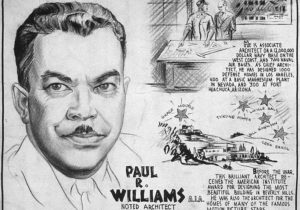
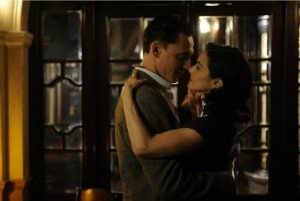
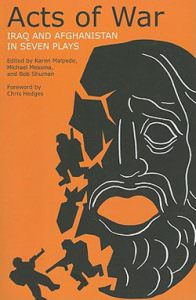

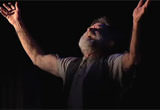
You need to be a supporter to comment.
There are currently no responses to this article.
Be the first to respond.